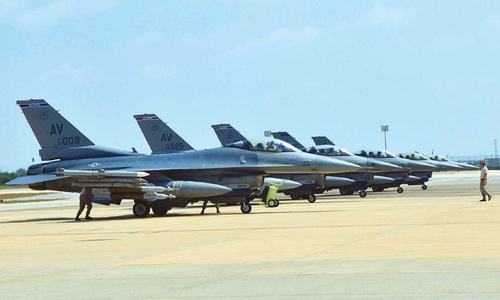ISLAMABAD: Adviser to the Prime Minister on Foreign Affairs Sartaj Aziz conceded on Thursday that relations with the US had been under stress for the past three months because of conditions Washington had attached to the funding of F-16s sale.
The confession was made by the adviser while winding up a debate in the Senate on an adjournment motion on the US decision to withdraw proposed subsidy on the sale of F-16 fighter jets to Pakistan.
The adviser said that Pakistan-US relations had come to a standstill in 2011 because of unfortunate incidents of WikiLeaks, Raymond Davis, Abbottabad operation, Datta Khel and Salala. Since 2013, he said Pakistan’s relations with the US had witnessed an “upward trajectory”.
“In the past three months, however, this upward trajectory in relations has witnessed a downward slide, as reflected in a decision of the US Congress to block partial funding for eight F-16 aircraft,” he said.
Mr Aziz said that the US action might have been caused by concerns raised by Washington on the nuclear issue which had been categorically rejected by Pakistan.
Haqqani network still top US concern
“We have also rejected frequent demands, especially by the US Congress, for the release of Dr Shakil Afridi. The US officials, Congress, think-tanks and media, in tandem with our adversaries, have also been blaming Pakistan for supporting the Haqqani network without giving any concrete evidence to enable us to take additional action against it or other terrorist organisations,” he added.
However, Mr Aziz said, the Haqqani Network issue remained the top US concern at the moment. The Indian lobby in the US, he said, had also been highly pro-active in adding fuel to the fire, especially after the Pathankot incident.
The adviser, however, assured the Senate that in view of the importance of the issue, Pakistan had been making all-out efforts to finalise the F-16 deal with the US administration. Mr Aziz said that the spring offensive launched by Afghan Taliban with the latest terrorist attack in Kabul had further aggravated the already bleak security situation in Afghanistan.
He said that Pakistan had been impressing upon the US and Afghan sides that the reconciliation process needed to be given a fair chance and more time and irreconcilable elements could be targeted after efforts for negotiations had failed.
“We hope to discuss these issues in detail during an upcoming meeting of the Quadrilateral Coordination Group in Islamabad on May 18 and 19.”
After the adviser’s speech, Senate Chairman Raza Rabbani who had made a strong observation against the US on Wednesday declaring it a “callous state”, referred the issue of the sale of F-16s jet fighters to the house committees on defence and foreign affairs with a directive to hold joint meetings and submit a report to the house over the progress on the issue in every session.
Mr Rabbani told members that on the request of the foreign ministry he had sent a letter to his US counterpart in March inviting him to visit Pakistan, but said that now he would revisit his decision to invite the US Senate chairman and only pursue the invitation in the light of the committees’ report on the matter.
Earlier, taking part in the debate in the opposition-less house, a number of senators criticised the government’s foreign policy with a particular reference to its relations with the US.
The opposition members have been boycotting proceedings of the Senate since Monday against the absence of the prime minister from the house.
The senators termed the US a friend which could not be trusted anymore.
They also criticised the US for expanding its relations with India, ignoring the fact that Pakistan had been its frontline partner in the war on terror.
They were of the view that the US had no care for sacrifices Pakistan had rendered and losses it had suffered in the war on terror.
Senator Mohsin Leghari termed the US decision to block F-16s sale to Pakistan a success of the Indian lobby and a failure of Pakistan’s diplomats.
“It seems that the Foreign Office is not even fully functional. We do not have any foreign minister,” he said.
Usman Kakar of the Pakhtunkhwa Milli Awami Party regretted that there had been no role of parliament in formulating the country’s foreign policy.
MAY 12 ANNIVERSARY: Speaking on “matters of public importance”, senators recalled the May 12, 2007, incident in which over 40 people were killed in Karachi due to firing by assailants when the then deposed chief justice of Pakistan visited the city during a movement for his restoration.
On the ninth anniversary of the incident, the speakers paid tribute to those killed in Karachi and called for registration of an FIR against former military ruler Gen Pervez Musharraf for the killing.
Published in Dawn, May 13th, 2016












































